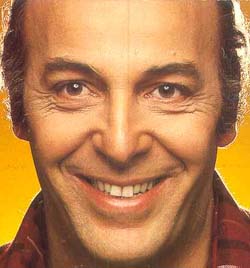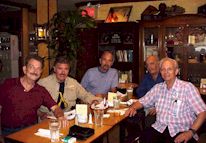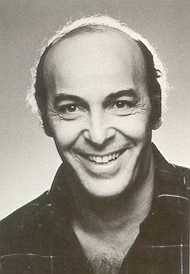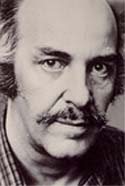
|
Love is Conspiratorial, Deviant & Magical
Raj Ayyar: George, it's an honor to interview you. Your insights have challenged so many negative myths and stereotypes about homosexuality. Can you tell us a little about the rhythms and patterns, the high points and the lows of your life? George Weinberg: The high point in my life was one that I certainly didn't see or appreciate when it happened because I was a few months old. My father, who was from a wealthy family and highly educated, a lawyer, Yale and Columbia, walked out with the benefit of a healthy push from my mother, a seventh grade graduate, who took a typing course and got a secretarial job as fast as she could. My father was a pedant and a bully who cared about nobody, and I was not to see him until I was eighteen. My mother was devoted, very bright, and above all, very humane. "You judge someone by how that person treats the least important person in his life," she would tell me often, and she watched over me to safeguard my caring as much as my intellectual development. Having her to myself without him anywhere near me was the great break of my life, one that I could evaluate only after getting to know him later on. It wouldn't have mattered to my mother if I married a black, was gay, lived in a commune or wore a dress. I didn't grow up with any concept of people being deviants unless they mistreated others. So the step into my later life was very small and took very little courage alongside the giant steps taken by some of my friends, especially my gay friends who had to first accept themselves, then love themselves, then make peace with their being outcasts and disappointments to others, and then build new lives. Another high point was getting a PhD in clinical psychology at Columbia and seeing how hidebound, unimaginative, inhumane and stupid my classmates and the professors were, with very few exceptions. I realized that the world was left to us who cared, it was our time, and that the people we looked up to had mainly climbed a many runged ladder to nowhere. Though I wasn't gay, I was loose in all the heterosexual ways that I could think of, and in other ways that I'd rather not put in print. And to quote Robert Browning, "And yet God has not said a word." Finally, fighting for gay rights, speaking out in various places and making friends, men and women, was great. I felt like an apostle of the obvious and people imagined that I was doing something daring. My mother would have done the same thing, and in fact one of the last things I placed in her hands, as she lay dying of a brain tumor, was my book summing up my views on the doctors who said that anal intercourse was sick but had lived their whole lives with their heads up their ass.
I am very proud of being the one to have coined the word. I remember the moment in 1965 when it came to me with utter clarity that this was a phobia. I was preparing a speech for a homophile group, which set me to thinking about "What's wrong with those people?" By "those people," I had in mind that day a few therapist friends who had liked a gay friend of mine, spoken well of her until I told them that she was a lesbian. Hearing that, they didn't want me to bring her to a party, as if she was a contaminant. Since I kept my own life quite a secret from them, having heard their views too often, perhaps a little bit of rage spurred me on to finding the word. The Roman poet, Catullus, describing how he came to write his love poetry, one wrote, "Anger moves my verse (Ira versum movet) amd I think that healthy anger at injustice has strengthened the love within the gay movement, of which I am very much a part. Raj Ayyar: What are the roots of homophobia? Or, if that's too broad a question, what environmental influences are likely to generate this blind fear and hate of gay people? George Weinberg: The roots of homophobia are fear. Fear and more fear. It is based on the preposterous notion that if you are like everybody else you will be safe, secure and happy. And in the extreme that if you are good, you won't die. "Well, no wonder he died, he smoked a few joints." Or "He went to India." Or "He was homosexual. I would never do that." Envy plays a part too because fearful people who constrict their lives resent others who don't constrict them in the same ways. Many people secretly think that gays are a lot happier than they are, and want to punish them. Of course, any answer to the question of how an illness develops,( and homophobia is an illness, no doubt about that) has to be incomplete. What worse illness can there be than acute conventionality. You should pray every night that you don't wake up with it.
As Alexander Pope put it "More true joy Marcellus exiled feels than Caesar with a senate at his heels." If this is so, the goal should be to become Marcellus, not Caesar. Raj Ayyar: Is there a 'universal' coming-out process? Can we apply a single Western post-Stonewall model of coming out, or do gays in different cultures need to work out their own indigenous, culture-specific ways of coming to terms with their sexuality? George Weinberg: There is no universal coming out process, so far as I know. I've met gays who never had a problem, especially women who came out during a love affair which bathed them in its beauty. And I've known people who came out with a sense of torture. I'm sure that every culture, every neighborhood, every family influences the experience. But the cure for most obstacles is, Be decisive. The world will step aside for nearly anyone who has the courage of his of her opinions. Raj Ayyar: In the new book Before Stonewall Jack Nichols remarks that 'while defining homophobia, (you) proffered a radical concept: healthy homosexuality.' What are some of the criteria defining a 'healthy' homosexual? George Weinberg: To love and to work these are the basics. I don't mean loving just one person, or your cat, though that's more than a start. We each have a personal myth, a vision of who we really are and what we want. Health means that part of what you want is to give to others. This isn't moral, it's psychological. As soon as your aim, is to achieve something for others, to give to others (or to at least one other person), you have that person along with you, as if watching you and rooting for you. You aren't alone. The healthy homosexual is simply a healthy person who happens to be homosexual and accepts this fact. As for work, whatever your work happens to be, I agree with Goethe who said "Only the person who has spent a lifetime of hard work can truly say, 'I have lived.'"
George Weinberg: I look ahead to the day when we won't think of anyone as gay or straight altogether. The fewer labels the better. Raj Ayyar: Does your model of homophobia apply as easily to lesbians as to gay men? Or, are there grounds for interpreting 'lesbophobia' differently than 'homophobia?' George Weinberg: The model applies but men tend to suffer more acutely. We have many cases of men committing suicide rather than face their own individuality. I know of no case of a woman who committed suicide because she was gay. Raj Ayyar: I have a great respect for the fact that you are one of the few avowed heterosexuals that championed the cause of gay rights for many decades. How did you get past homophobia? George Weinberg: I've had so many friends who were homosexual and who shared interests with me, who were generous and non-competitive and sensitive. I couldn't afford to lose them and to condemn them in my own mind would be to lose them. So I lined up with them emotionally. I'm really not an avowed heterosexual. I'm no more proud of it than of being white or tall. As T.S. Eliot put it, "I could have been a pair of ragged claws, scuttling across the floors of silent seas." We're all here at the same time and we should celebrate that. Raj Ayyar: Are your wife and family okay with your pro-gay activism and writing? George Weinberg: My family is better than OK. Raj Ayyar: You are quoted as saying that 'all love is conspiratorial and deviant and magical.' I love the quote. But, what does it mean? George Weinberg: All love is original, no matter how many other people have loved before. It is the greatest possible leap of faith and trust, a bearing of the soul. Here we are, as Whitman put it, in measureless oceans of space…hoping to catch somewhere. Whitman was comparing love with the task of the spider trying to reach across a void. The very decision to do this instead of to wear a full metal jacket is a conspiracy. All who love are conspirators. We refuse to go with the drift of things and gays are really more conspicuous instances because their love is questioned.
George Weinberg: An essential idea is that if you give to some person or endeavor in life, you will make that more important. Coming out to gays is a way of affirming sanity and self-worth. We are constantly creating ourselves by what we move toward or away from. If every time you engage in a sex act, you go into a confession box, you will never accept your own sexuality. I found in my own life that heterosexual acts that initially made me feel like a freak became second nature and quite reasonable very quickly. That was because I didn't atone. The important thing is not to hurt other people. If they hurt themselves by staying up all night worrying about your behavior that is their own self-tortured decision. Raj Ayyar: Tell us a little about the gay savants of your acquaintance: Frank Kameny, Barbara Gittings, Arthur Evans, Jack Nichols, Lige Clarke, Randy Wicker, to name but a few... George Weinberg: My dearest friend in the movement is Jack Nichols. If there were no such thing as gay or straight, we would still talk and share experiences till the end of time. Jack liberated me as a writer. I had a great deal of trouble recovering from advanced university study and Jack helped me to write more the way I talk. We are in close communion and have been for decades. Frank Kameny is a genius who happens to be on the side of the angels. He has tirelessly outsmarted machines set up to destroy human rights. He has gone into the depths of mental hospitals and prisons to rescue people, much the way Hercules went into the underworld of hell. He has turned down food money from me and others to give it to the movement. I have admired Frank since the early 1960s and have felt that I should be doing more. Barbara Gittings, also a dear friend, whom I should see more often, is a cheerful, exuberant and incredibly smart woman. She is never at a loss for the right words. She has persuaded the American book lending and book selling world to honor gay literature - all at her own expense. Though not a professional librarian, she confirms a great statement made about Heinrich Schliemann who discovered the ruins of Troy: "This life testifies that a talented and exuberant non-professional can achieve more than a whole university of scholars." Like Schliemann, Barbara went there and did that. And is still doing it. Arthur Evans is a brilliant thinker, and a lament of my life is that I only know him casually and haven't seen him since the days when the GAA (Gay Activists Alliance) stirred the Eastern seaboard to reconsider attitudes toward gays. I will never forget a few speeches he made. He is a master teacher who simplifies hard ideas to the point where any sane person would wonder why he's even bothering to say what he's saying. Lige Clarke was a dear friend, articulate, physically beautiful, and pure. Along with Jack Nichols, he ran the spectacular newspaper GAY, but like other great romantic poets he was taken from us too soon.
Raj Ayyar: George, it's been a pleasure and a joy talking with you. Thank you for sharing your insights with us. George Weinberg: Thank you, Raj. Books by George Weinberg The Action Approach. New York: St. Martin's Press, 1969 The Heart of Psychotherapy: A Journey into the Mind and Office of a Therapist at Work. New York: St. Martin's Press, 1984, reprinted 1996. Invisible Masters: Compulsions and the Fear that Drives Them. New York: Grove/Atlantic Press, 1993. Nearer to the Heart's Desire. New York. Grove/Atlantic Press, 1992 Numberland. New York: St. Martin's Press, 1987 The Pliant Animal: Understanding the Greatest Human Asset. New York: St. Martin's Press, 1981 Self Creation. New York: St. Martin's Press, 1978 Shakespeare in Love. New York: St. Martin's Press, 1991 Society and the Healthy Homosexual. New York: St. Martin's Press, 1972, reprinted 1983 Statistics: An Intuitive Approach. Belmont, California: Brook's/Cole, fourth printing, 1981 The Taboo Scarf. New York: St. Martin's Press, 1990 Books by George Weinberg and Diane Rowe The Projection Principle. New York: St. Martin's Press, 1988 Will Power! Using Shakespeare's Insights to Transform Your Life. New York: St. Martin's Press, 1996 Newspaper Columns by George Weinberg GAY, Four Swords, Inc., New York, 1970-1973. |
|
 While clinical psychologist and gay activist George Weinberg is credited with coining the term 'homophobia', his career's work and contribution to the gay civil rights movement have been extensive
While clinical psychologist and gay activist George Weinberg is credited with coining the term 'homophobia', his career's work and contribution to the gay civil rights movement have been extensive  In New York, celebrating the 30th anniversary of the Stonewall revolt:
(left to right: Dick Leitsch, John Paul Hudson, Jack Nichols,
Dr. George Weinberg, and Randolfe Wicker)
In New York, celebrating the 30th anniversary of the Stonewall revolt:
(left to right: Dick Leitsch, John Paul Hudson, Jack Nichols,
Dr. George Weinberg, and Randolfe Wicker)  Dr. George Weinberg in 1980
Dr. George Weinberg in 1980  Weinberg's 1972 book, Society and the Healthy Homosexual
Weinberg's 1972 book, Society and the Healthy Homosexual Self Creation was published in 1978
Self Creation was published in 1978  Dr. Weinberg is pictured here in one of his latest books
Dr. Weinberg is pictured here in one of his latest books